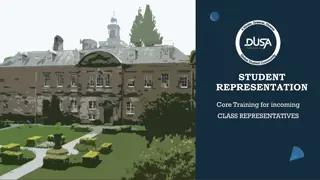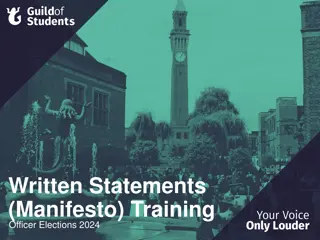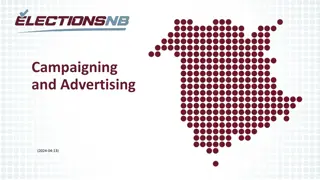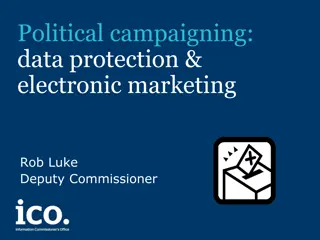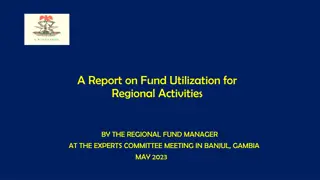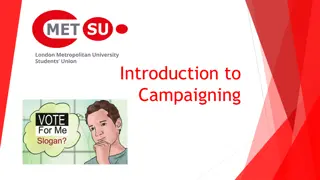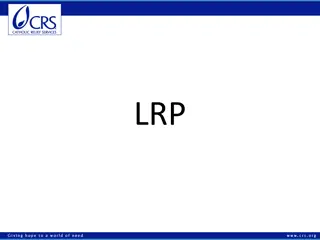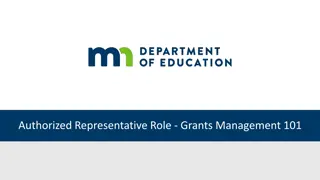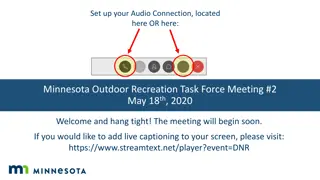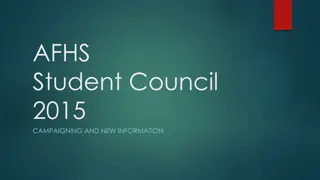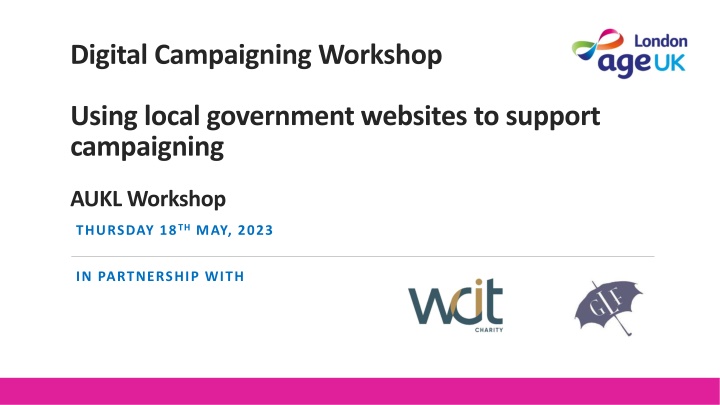
Utilizing Local Government Websites for Effective Campaigning Workshop
Explore how to leverage local government websites for successful campaigning in a workshop covering topics like finding representatives, utilizing council websites, and engaging in local governance. Learn about contacting councillors, accessing relevant information, and amplifying your campaign using online resources. Discover how to make your voice heard and influence decision-making through digital means.
Download Presentation

Please find below an Image/Link to download the presentation.
The content on the website is provided AS IS for your information and personal use only. It may not be sold, licensed, or shared on other websites without obtaining consent from the author. If you encounter any issues during the download, it is possible that the publisher has removed the file from their server.
You are allowed to download the files provided on this website for personal or commercial use, subject to the condition that they are used lawfully. All files are the property of their respective owners.
The content on the website is provided AS IS for your information and personal use only. It may not be sold, licensed, or shared on other websites without obtaining consent from the author.
E N D
Presentation Transcript
Digital Campaigning Workshop Using local government websites to support campaigning AUKL Workshop THURSDAY 18THMAY, 2023 IN PARTNERSHIP WITH
House keeping Fire exit & Toilets Group work with feedback We are all at different digital stages and using different devices Slides will be sent out Let us know if there is any issue with the sound Evaluation and Equalities Form Let us know other topics for future sessions
1. Two sessions: - A: Using your local council website to support a campaign. - B:Using the London Assembly website to support a campaign. Today s Programme 2. Each session will cover: - Knowing who your representatives are. - Finding out information to support your camp. - How local government websites can allow you to be heard and have influence. 3. Each session will be followed by an activity with time for questions.
Session 1: Using your local council website to support campaigning In this session we are going to explore: - Knowing who your councillors are and how to contact them using your council website. - How you can use your local council website to find out information for your campaign. - - Using your council website to take amplify your campaign.
Councillors: Finding out who your councillors are and how to contact them using A group of people in suits Description automatically generated with low confidence On the homepage of your local council website you can: - Search councillors in the search. - Or, navigate the website. First look for a section often called Democracy or Decision making .
Councillors: About your councillor A person in a suit and tie Description automatically generated with medium confidence After you have found the councillor you were looking for you can often click a link to find out more information about them such as which committees they are on. It is not only your local councillor that you may be interested in. It may be a councillor with a specific responsibility like a Cabinet Member or committee Chair.
Other websites you can use to find out who your councillor is: London Councils: Local government directory. https://directory.londoncouncils.gov.uk/ Write To Them. https://www.writetothem.com/
Your councillors email address 1. The webpage about your councillor should have your councillors email address. 2. All councillor emails end in @NameOfCouncil.gov.uk BUT the formatting is different. - Cllr.Jane.Smith@brent.gov.uk - councillor.Jane.Smith@bexley.gov.uk - Jane.Smith@bromley.gov.uk - cllr.J.Smith@wandsworth.gov.uk 3. Or you can go to https://www.writetothem.com/
Using council websites to find out information 1. e.g. https://www.lbbd.gov.uk/council-and-democracy/plans-and- priorities 2. Some council websites have decision making portals https://democracy.islington.gov.uk/mgDelegatedDecisions.aspx 3. Information published before or agreed at meetings such as questions from councillors e.g. https://democracy.islington.gov.uk/ieListDocuments.aspx?CId=267&MId=4205&Ver=4 Find key policies and plans:
Asking questions to the council. You can ask a councillor to ask a question for you should be able to ask a question yourself. This could be: - Submitting a question in writing - Attending a council meeting and asking a question in-person. Finding out how to ask a question. - Some council websites have webpages that give details (often these are on webpages called Attending meetings ) - E.g. https://www.merton.gov.uk/council-and-local-democracy/decision-making/attending-meetings or https://www.barnet.gov.uk/your-council/democracy-barnet/resident-decision-making/get-involved-your- council/ask-public
Council democracy teams will be able to help All councils have staff members in a democracy team . Sometimes these are called Democratic services departments. Part of their role is to help residents engage in democratic processes and they will be happy to provide information about asking questions and other ways to engage with your council.
Council democracy teams will be able to help DemocraticServices@walthamforest.gov.uk democratic.services@merton.gov.uk They should be able to advise on specific processes and deadlines for asking questions ahead of meetings.
Using online calendars to find out about future and past meetings You can use the calendar to find out about future meetings (agendas, reports etc.). It may be that you would like to ask a question at an upcoming meeting. You can find details of webcasts as you may be able to watch a meeting online. You can find the minutes and reports from previous meetings including questions that have been asked and the answers given.
Using online calendars to find out about future and past meetings A screenshot of a calendar Description automatically generated
If its not possible to find the information you want on a council website: You could make Freedom of Information (FOI) request. Under the Freedom of Information Act and Environmental Information Regulations you have the right to request any recorded information held by a public authority. https://www.whatdotheyknow.com/ FOI email addresses (every council) Database Usually FOI emails are foi@councilname.gov.uk
How council websites can help amplify your campaign: Petitions If you want to demonstrate that there is (local) public support for the council to take a particular action you can submit a petition (the more signatures the better but signatories must live in the borough). You can use petition websites like change.org or 38degrees to set up an online petition Many councils offer their own website as a way to set-up and submit a petition. You can search for these in the democracy sections of the website or contact the democracy team if you can t find them.
How council websites can help amplify your campaign: Petitions Councils should offer information about: Your petition being heard at a full council meeting Petition thresholds. E.g. Islington If the petition has received between 1,000 and 2,000 signatures, the petition organiser can request a meeting with the Leader of the Council or the Executive Member with the relevant portfolio responsibilities. If the petition has received 2,000 signatures or more, a debate of up to 15 minutes, will be held on the subject of the petitions Examples include: https://democracy.islington.gov.uk/mgEPetitionListDisplay.aspx https://moderngov.sutton.gov.uk/mgEPetitionListDisplay.aspx?bcr=1
How council websites can help amplify your campaign: Deputations You can also use your council website to find out about how to form a deputation. Deputations are a way of lobbying the council to let them know about a concern you have that is shared with people who you live or work near to. A number of people (deputation) can send in a requisition (written request) to the council together with a written statement saying what their deputation is about. If the request is agreed they will be invited to the meeting and have the opportunity to speak directly to the Members of the council.
How council websites can help amplify your campaign: Deputations You will often find details of how to prepare for and submit a deputation in the meetings section of a council website. E.g. Haringey: https://www.haringey.gov.uk /local- democracy/meetings/deputa tions
Activity Find out the email address of one of your local councillors and the name of at least one committee that they are on. And if you have time Find out the date of the next Full Council Meeting in your borough.
Councillors: Finding out who your councillors are and how to contact them using A group of people in suits Description automatically generated with low confidence On the homepage of your local council website you can: - Search councillors in the search. - Or, navigate the website. First look for a section often called Democracy or Decision making .
Session 2: Using www.london.gov.uk to support campaigning
The Greater London Authority Mayor of London London AssemblyFunctional bodies London Fire Commissioner
14 of the 25 Assembly Members represent constituencies. These supe-constituencies can incorporate up to 3 boroughs
London Assembly Members: Finding out who your Assembly Members are and how to contact them Go to https://www.london.gov.uk/who-we- are/what-london-assembly- does/london-assembly-members
Councillors: About your Assembly Member After you have found the Assembly Member (AM) you were looking for you can click on their photo to find out more information about them such as which committees they are on. As well as your constituency Assembly Member there are Londonwide AMs you can contact.
Your Assembly Members email This is always Firstname.surname@london.gov.uk
You can also use: Write To Them. https://www.writetothem.com/
You can sign up for updates about the London Assembly: https://www.london.gov.uk/who-we-are/what-london- assembly-does/connect-us Other useful pages https://www.london.gov.uk/who-we-are/what-london- assembly-does/about-london-assembly https://www.london.gov.uk/who-we-are/what-london- assembly-does/assembly-member-press-releases
London Assembly Committees https://www.london.gov.uk/who-we-are/what-london-assembly- does/london-assembly-work/london-assembly-committees
Using the online calendars to find out about future and past committee meetings, Mayor s Question Times https://www.london.gov.uk/about- us/londonassembly/meetings/mgCalend arMonthView.aspx? Meetings are livestreamed and you can watch past meetings
Asking questions to the Mayor Suggest a question Only Assembly Members can put questions to the Mayor at Mayor's Question Time, but you can suggest a question to be asked by emailing suggestaquestion@london.gov.uk. Please state whether you would like your question to be forwarded to a particular Assembly Member or to a political group (Conservative, Labour, Liberal Democrat, Green). You could also email an Assembly Member directly
Find an answer to a previously asked question https://www.london.gov.uk/who -we-are/what-london-assembly- does/questions-mayor/find-an- answer? You can search thousands of questions asked over the past 10 years
You can ask an Assembly Member to submit a petition on your behalf Information about petitions can be found at: https://www.london.gov.uk/who -we-are/what-london-assembly- does/petitions

